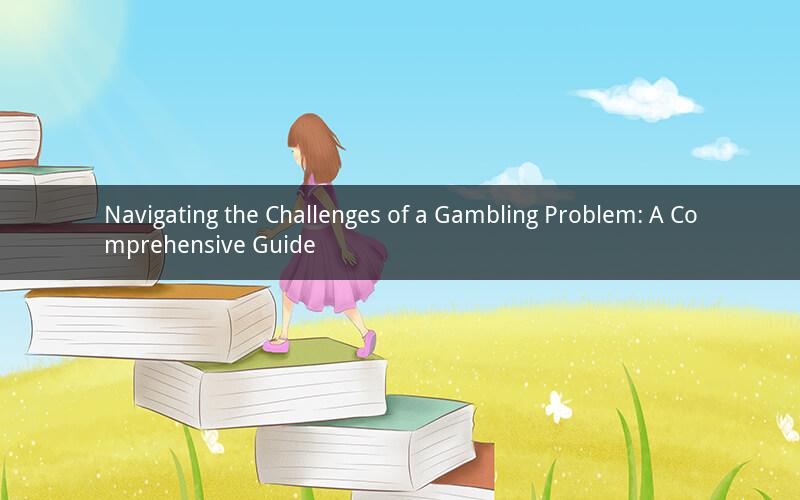
Introduction:
Gambling can be an enjoyable pastime for many, but for some, it can quickly spiral into a problematic addiction. If you find yourself struggling with a gambling problem, it's crucial to take immediate action to address it. This guide will provide you with valuable insights on what you can do to overcome your gambling addiction and regain control of your life.
1. Understanding the Problem:
Before taking any action, it's essential to acknowledge and understand the nature of your gambling problem. Here are some key points to consider:
- Recognize the signs of a gambling problem: If you find yourself chasing losses, spending more money than intended, or neglecting responsibilities due to gambling, it's a sign that you may have a problem.
- Assess the impact of your gambling: Consider how your gambling habits have affected your financial, emotional, and social well-being. Reflect on any negative consequences that have arisen as a result of your gambling.
2. Seeking Support:
Support is crucial when dealing with a gambling problem. Here are some ways to seek assistance:
- Reach out to friends and family: Communicate your struggles with those you trust. They can offer emotional support and hold you accountable.
- Attend support groups: Joining a support group, such as Gamblers Anonymous, can provide a sense of community and understanding. Sharing your experiences with others who have faced similar challenges can be incredibly beneficial.
- Consider professional help: If your gambling problem is severe, seeking the assistance of a therapist or counselor specializing in addiction can be invaluable. They can provide personalized guidance and help you develop coping strategies.
3. Taking Control of Your Finances:
Addressing your financial situation is a crucial step in overcoming a gambling problem. Here are some strategies to regain control:
- Create a budget: Establish a realistic budget that allocates funds for essential expenses, savings, and entertainment. Stick to this budget to avoid overspending.
- Seek financial counseling: If you're struggling to manage your finances, consider seeking the help of a financial counselor. They can provide guidance on budgeting, debt management, and rebuilding your financial stability.
- Avoid gambling-related triggers: Remove any reminders of gambling from your surroundings, such as advertisements or gaming websites, to reduce the temptation.
4. Developing Coping Mechanisms:
Finding healthy coping mechanisms is essential to avoid relapse. Here are some alternatives to gambling:
- Engage in hobbies: Find activities that you enjoy and can provide a sense of fulfillment. Whether it's painting, exercising, or learning a new skill, these activities can help distract you from the urge to gamble.
- Practice stress management techniques: Identify stressors in your life and develop strategies to manage them effectively. Techniques such as meditation, deep breathing exercises, or yoga can help reduce stress and prevent the urge to gamble.
- Build a support network: Surround yourself with positive influences who support your journey towards recovery. This can include friends, family, or support group members.
5. Staying Committed to Recovery:
Overcoming a gambling problem is a continuous process. Here are some tips to help you stay committed to recovery:
- Set realistic goals: Establish achievable goals that will guide your progress. Celebrate small victories along the way to maintain motivation.
- Monitor your progress: Keep track of your progress and setbacks. Reflect on what works well and what doesn't, and adjust your strategies accordingly.
- Stay committed: Remember that recovery is a lifelong journey. Stay committed to your goals and seek support whenever needed.
Frequently Asked Questions:
1. Can I overcome a gambling problem on my own?
While some individuals may find success in overcoming their gambling problem independently, seeking support from friends, family, or professionals can significantly increase your chances of recovery.
2. How long does it take to overcome a gambling problem?
The duration of recovery varies for each individual. Some may experience immediate relief, while others may require ongoing support and therapy for several months or even years.
3. Can I still enjoy gambling in moderation after overcoming my addiction?
Recovering from a gambling addiction doesn't mean you have to completely eliminate gambling from your life. However, it's crucial to approach it with caution and establish strict boundaries to prevent relapse.
4. Will I always be prone to relapse?
Relapse is a possibility, but with proper coping mechanisms and support, you can minimize the risk. Stay vigilant and be prepared to seek help if you experience any signs of relapse.
5. Can my gambling problem affect my relationships?
Yes, a gambling problem can strain relationships with friends, family, and loved ones. Seeking support and working on rebuilding trust can help restore and strengthen these connections.